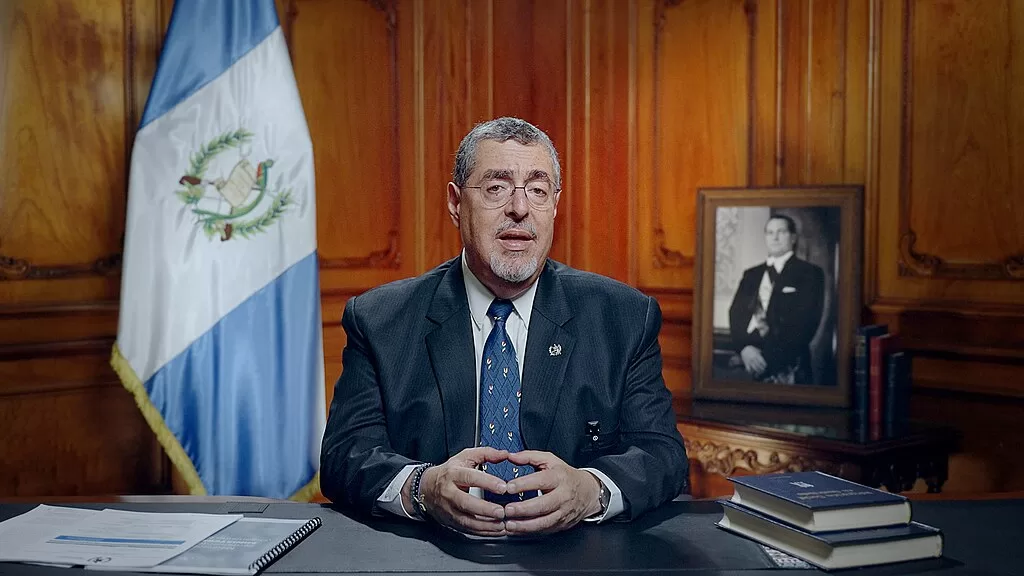On January 15, 2024, president-elect Bernardo Arévalo of the Semilla Party was inaugurated after five tense months since he was elected on August 20, 2023. (Inauguration day in Guatemala is usually held on January 14 but constitutional challenges to president-elect Arévalo delayed the ceremony nine hours until shortly after midnight.) Guatemalans from all sectors (led by the Indigenous communities), international non-governmental organizations like Latin America Working Group (LAWG), and foreign governments mobilized to prevent corrupt public and private actors from overturning the people’s vote.
Nearly a month after Arévalo’s inauguration, President Nayib Bukele was unconstitutionally re-elected to a second term in El Salvador after passing far-reaching electoral reforms and employing his well-heeled propaganda machine to influence the vote. While civil society organizations inside and outside El Salvador repeatedly raised the alarm about his re-election and the human rights implications of second term, the international community was largely silent.
What will the future of these two presidencies look like for human rights defenders? Will the U.S. government continue with a divided strategy towards the two countries? For Guatemalan and Salvadoran human rights defenders, the next four to five years under these two presidencies will be very different. And whether the U.S. will continue to back Arévalo or change its approach to Bukele on human rights is uncertain.
Before and during the elections, the LAWG team actively monitored the elections processes in both countries. We organized two delegations from El Salvador prior to the elections, held webinars with exiled Guatemalan judicial champions and human rights leaders, and participated in an observation mission in the second round of elections in Guatemala. What was clear is that there is cautious optimism for a human rights agenda under Arévalo, but under a second Bukele term, a deep foreboding that human rights violations will rise to levels not seen since the civil war.
The hope stems from President Arévalo’s commitment to strengthening Guatemala’s political institutions and aggressively eradicating corruption in order to reverse the democratic backsliding and restore people’s faith in government. In his first 100 days, he has formed a National Anti-Corruption Commission tasked with creating systems to end corrupt practices in public institutions, made some progress on efforts to make public works contracting more transparent, pushed meritocracy in his Cabinet, established a regular schedule for meeting with Indigenous leaders, and restored Guatemala’s image on the world stage with visits to the U.S. and European countries who have pledged their support to his government. These are important steps toward fulfilling a human rights agenda.
But the corrupt structures that nearly succeeded in keeping him out of office still exist and will stop at nothing to destabilize his government. Attorney General Consuelo Porras, sanctioned by the U.S., has twice refused to meet with Arévalo, despite her resignation being a key demand of most Guatemalans due to her persecution of anti-corruption champions and failure to prosecute corrupt actors. Her refusal to resign forced President Bernardo Arévalo to present an initiative to Congress that could reform the law governing the Public Prosecutor’s Office allowing for her removal. The “dark cycle of Consuelo Porras must end now,” he stated. Two weeks earlier, the Constitutional Court ruled the Semilla Party unconstitutional. By stripping them of a party affiliation, Semilla legislators are unable to chair or participate in congressional committees. Already in the minority, this will make it even harder for them to form alliances or advance their political agenda.
The risk is that the Guatemalan people, eager for social and economic change, will grow impatient with the popular president, playing into the hands of corrupt public and private actors who want to see his government fail. For the moment, however, President Arévalo has the backing of Guatemalan citizens and the international community.
In neighboring El Salvador, Nayib Bukele was unconstitutionally reelected with 82.7% of the vote. His New Ideas Party consolidated its one-party rule in the legislature on February 4, 2024, eliminating all checks and balances. Yet the context of his popularity is entirely different from that enjoyed by President Arévalo. His popularity stems both from his crackdown on gangs and his massive propaganda machinery that enlarges his tepid accomplishments.
Ending the gang violence that has long tormented Salvadorans since the U.S. deported gang members from California in the 1990s cannot be underestimated. However, the two-year state of emergency has come at a steep price to constitutional protections and the right to due process. Under this draconian policy, people can be arbitrarily arrested and detained without charge, denied a prompt hearing or a lawyer, spend years in pre-trial imprisonment and charged in mass trials with faceless judges. Over 70,000 people (2% of the population) have been detained, at least 241 people have died in prison, and 327 people have been disappeared. Non-governmental organizations such as Cristosal, Amnesty International, DPLF among others have exposed that the “permanent measure of repression and human rights violations” that have occurred since the state of emergency began is state policy and has become normalized. These harsh conditions are also fueling out-migration.
On April 29, the Salvadoran legislature approved a change to Article 248 of the Constitution which will allow constitutional reforms without having to wait for the approval of a succeeding legislature—a measure established to prevent dictatorial governments from making reforms that diminish human rights or erode democracy. Critics of Bukele are concerned that this move further consolidates power in the hands of the presidency, and opens the possibility of his staying in power indefinitely while limiting public participation in government.
The U.S. State Department’s recently released 2023 Human Rights Report on El Salvador acknowledges that:
“Significant human rights issues included credible reports of: unlawful or arbitrary killings; enforced disappearance; torture or cruel, inhuman, or degrading treatment or punishment by security forces; harsh and life-threatening prison conditions; arbitrary arrest or detention; serious problems with the independence of the judiciary; arbitrary or unlawful interference with privacy.”
Notwithstanding, the Biden administration has been silent on Bukele’s unconstitutional reelection, the recent constitutional reform to Article 248, the lack of transparency or accountability, the erosion of judicial independence, and the democratic deterioration in the country. This is in sharp contrast to its role in support of the electoral process in Guatemala of then-candidate Arévalo and free and fair elections. On the silence, Representative Jim McGovern (D-Mass.) said that the “international community and the Biden administration should continue to raise issues about constitutional integrity, election integrity, democracy and a slide toward authoritarianism, and human rights at every chance they get.”
And with your help, this is exactly what LAWG will continue to do. We will push the Biden administration to do the right thing and urge policymakers to protect human rights, promote good governance, back anti-corruption measures, and advance economic and environmental rights.
(Vicki Gass, Executive Director of the Latin America Working Group (LAWG), has been working on Central American social and economic justice issues since 1984 and has lived in both El Salvador and Honduras. Courtesy: The Latin America Working Group (LAWG). The LAWG, together with its sister organization, the Latin America Working Group Education Fund (LAWGEF), mobilises concerned citizens, organizations, and networks to call for just U.S. policies towards Latin America and the Caribbean.)




